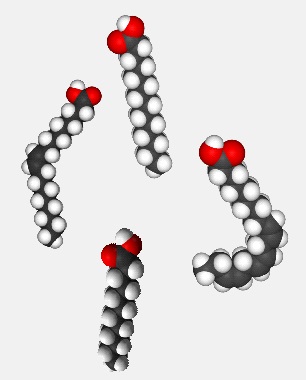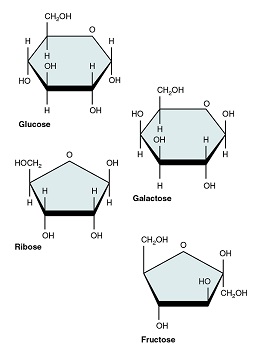Analytical Services
Two Types of Trial Studies That We Offer:
(1) Basic Trial Study: Performing a preliminary experiment to prepare/analyze pilot samples and to develop a basic protocol. During such a study, the user will be able to obtain GC profiles and Mass-spectra as references for future formal studies. This study does not include data analysis and/or chemical identification (ID)
(2) Full Trial Study: This study is aimed to develop a relatively efficient protocol to prepare and analyze biological samples. In addition to turning in all of the GC profiles and Mass-spectra to the user, the experimental procedures used and a basic summary of the analysis results will also be included. The protocol can then be used to analyze larger sample sizes in the future. The chemical identification (ID) or determination will not be included.
Lipid (Fatty Acids) Analysis with GC/MS1
The Analytical Instrumentation Core (AIC) offers Fatty Acid analysis where we can detect and quantify both free and total fatty acids through the use of our HP 6890/5973 Gas Chromatograph and Mass Spectrometer (GC/MS). Our GC/MS is designed for analyzing small molecules (up to 1,000 Da) such as fatty acids, lipids, monosaccharides, amino acids and neurotransmitters.
Currently, we are able to analyze the following sample types*:
-
-
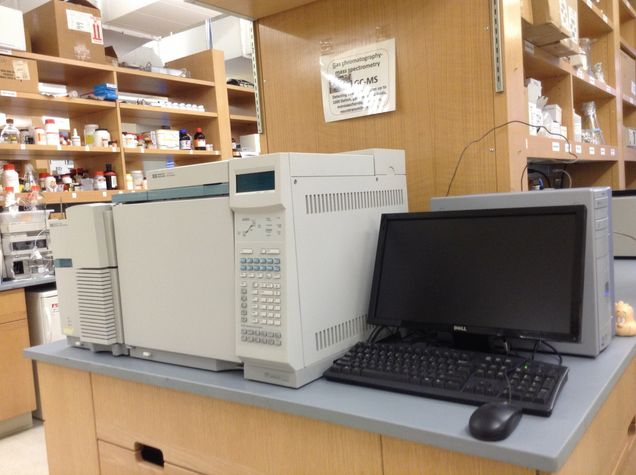
HP 6890/5973 GC/MS
Plasma
-
Blood
-
Cell lines
-
Tissues
-
Cell Filtrates
-
Microorganisms (BSL2)
-
Other Biological Samples
-
*If your sample type is not listed above please let us know and we can discuss other ways of analyzing your sample!
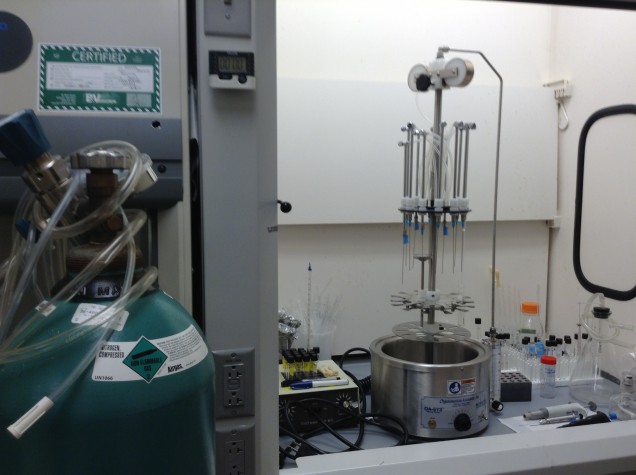
Equipment for Fatty Acid Extraction
Classes of Fatty Acids Monitored:
-
-
C12:0 Lauric (Dodecanoic) Acid
-
C14:0 Myristic (Tetradecanoic) Acid
-
C15:0 Pentadecanoic Acid
-
C16:0 Palmitic (Hexadecanoic) Acid
-
C17:0 Margaric (Heptadecanoic) Acid
-
C18:0 Stearic (Octadecanoic) Acid
-
C18:1 Oleic Acid
-
C18:2 Linoleic Acid
-
C18:3 Linolenic Acid
-
C20:0 Eicosanoic (Arachidic) Acid
-
C20:3 Dihomo- gamma linoleic Acid
-
C20:4 Arachidonic Acid
-
C22:0 Behenic (Docosanoic) Acid
-
2) Volatile Organic Compound (VOCs) Analysis Using SPME
- The Analytical Instrumentation Core (AIC) offers headspace sampling with SPME in order to extract volatile organic compounds (VOCs) from both liquid and solid phase samples. For more information, please feel free to contact us!
How We Analyze Your Samples:
FA Standards are first added to samples. Lipids are then extracted (saponification is done for total FA only). Chemical derivitization occurs (methylation). And the sample is injected into the GC/MS for analysis. Finally, data is collected and organized into a report.
How the Results Are Reported:
For Free Fatty Acids Analysis: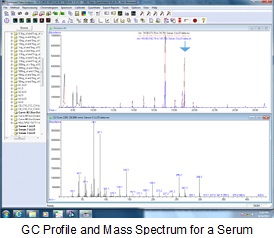
-
- Classes of the free fatty acids in the sample
- Concentration of each free fatty acid (µg/ml)
- Percentage (%) of each fatty acid out of the total amount of fatty acids
For Total Fatty Acids Analysis:
-
- Classes of the total fatty acids in the sample
- Concentration of each fatty acid (µg/ml)
- Percentage (%) of each fatty acid out of the total amount of fatty acids
Pricing: TBD (Project Dependent)
1Project is also a collaboration between the AIC and the Metabolomics Service Center
3) Sugars or Monosaccharides Analysis with GC/MS
In addition to fatty acid analysis, the AIC is also offering monosaccharide analysis using our HP 6890/5973 GC/MS.
Currently, we are able to analyze the following sample types:
-
- Plasma
- Blood
- Cell lines
- Tissues
- Cell Filtrates
- Microorganisms (BSL2)
- Other Biological Samples
How We Analyze Your Samples:
First, internal standards will be added to your samples before the actual sample extraction takes place. Next, the sugars are hydrolyzed through acid-catalyzed reactions. The sugars are then reduced, chemically derivatized and then injected into the GC/MS for analysis. Finally, the data is collected and organized into a report for the user.
Classes of Sugars Monitored:
-
- Pentoses
- Hexoses
- Aminosugars
- Glucose
- Galactose
- Mannose
- Fructose
- Rhamnose
- Ribose
- Arabinose
- Xylose
- GlcN
- Others*
*Please inquire about other sugars that are not on this list to see if we are able to analyze them
How the Results Are Reported:
-
- Classes of the monosaccharides in the sample
- Concentration of each sugar/monosaccharide (µg/ml)
- Percentage ratio of each sugar out of the total sugars (%)
Pricing: TBD (Project Dependent)
3) Other Services for Biochemical and Physiological Analysis
The Analytical Instrumentation Core possesses multiple analytical instruments to fit the ongoing needs of a wide variety of users. AIC personnel are able to perform various analyses that cater to the needs of individual projects. The analytical instruments include: GC, GC/MS, HPLC machines, FPLC machine, Electrophoresis, Spectrophotometers (plate readers), Blood Analyzer, Chemistry Analyzer, Seahorse Oxygen (pH) Analyzer, qPCR (2 StepOne Pluses) and qRT-PCR (ABI 7900) and instruments for the multiplexing of proteins and cytokines. Our services are most beneficial for: starting projects, laboratories that are lacking in personnel and expertise, epidemiological studies and clinical research. As always, all charges will be reasonable, negotiable and will depend on the specific needs of the project.
Sample Disclosure Form
The Analytical Instrumentation Core requires that all experiments conducted adhere to IBC measures and that a “Sample Disclosure Form” be completed for all samples that are submitted to the core. Samples without the accompanying form will not be accepted under any circumstances. Please find a copy of the form below:
Contact
For further information on our Analytical Services or to schedule a meeting to develop a project, please contact:
Lynn DengDirector of Analytical Instrumentation Core
650 Albany St Rm 848
Boston MA 02118
lynndeng@bu.edu
617-638-6920 Matthew Au
AIC Lab Manager
650 Albany St Rm 830
Boston MA 02118
mau115@bu.edu
617-414-2964

